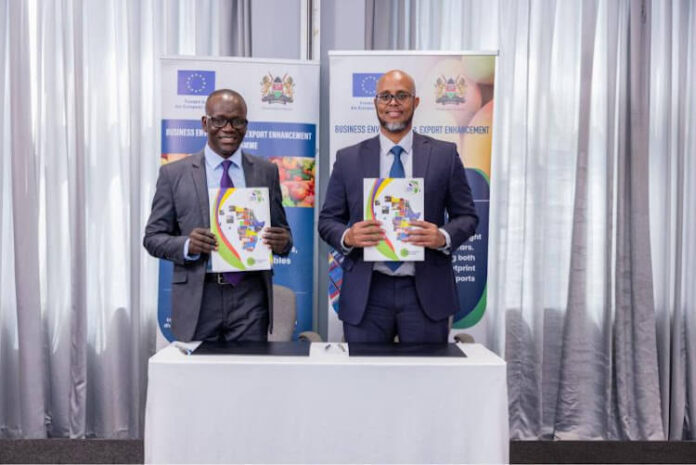
The Kenyan fresh produce industry players, TradeMark Africa (TMA) and the National Horticulture Taskforce (NHT) have signed a technical and financial support agreement aimed at strengthening and sustaining investments in the country’s fresh produce exports.
The agreement, a component of the EU-funded Business Environment and Export Enhancement Programme (BEEEP), was formalized to support the transition of 50 percent of Kenya’s fresh produce exports from air to sea freight by 2030.
This milestone was celebrated at an event attended by stakeholders from the logistics sector. The gathering aimed to assess the current state of agro logistics in Kenya and review the country’s master plan for shifting fresh produce exports from air to sea freight.
According to Clement Tulezi, Chairperson of the National Horticulture Taskforce, Kenya’s decision to move from airfreight to sea freight goes beyond environmental considerations. It is also seen as a crucial economic advantage to safeguard the country’s fresh produce exports, especially as UK and European supermarkets actively seek to reduce their climate footprint.
Highlighting the environmental impact, Tulezi pointed out that airfreighting from Kenya to Europe results in significantly higher greenhouse gas emissions compared to sea freight. As an example, he noted that one kilogram of air-freighted green beans emits as much as 177 kilograms of sea-freighted green beans.
“As part of NHT’s initiatives, there’s a focus on enhancing the capacity of horticultural producers. This involves adopting sustainable practices like using renewable energy, implementing water conservation methods, and shifting fresh produce exports from air freight to sea freight,” Tulezi said.
Sustainable production and transport
Henriette Geiger, Ambassador of the European Union to Kenya said they are fully in support of the NHT as they transition the avocado, mango, and vegetable value chains towards more sustainable production processes from farm to fork.
“This also aligns with our Generation Green Campaign, where we are targeting increased productivity that will stimulate economic development through job creation, but sustainably and inclusively,” Geiger said.
Ahmed Farah, TradeMark Africa’s Kenya Country Director, highlighted the pivotal role of Kenya’s horticulture sector in the nation’s economy. With significant potential for driving economic growth, creating jobs, and diversifying agriculture, this sector encompasses the cultivation and export of high-value crops such as cut flowers, fruits, and vegetables. While contributing to economic progress and poverty reduction, it also faces challenges, according to Farah.
“Transport bottlenecks, quality control issues, market access barriers, and sustainability demands hinder the sector’s growth. The Collaborative Learning and Adaptation (CLA) event today aims to tackle these obstacles and unlock the full potential of our horticultural industry,” he said.
“As the world embraces sustainable production, Kenyan producers must adopt eco-friendly practices for net zero carbon emissions. This partnership is crucial for helping producers meet these requirements,” said Farah.
Earlier this year, the European Union signed a Sh4.2 billion agreement with TMA to support the Business Environment and Export Enhancement Programme (BEEEP).
Farah said that BEEEP, a distinctive export-focused value chain ecosystem, aims to address challenges in mangoes, avocados, and vegetable value chains. Its goal is to boost competitiveness and expand access to specific export markets.







